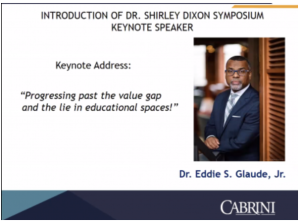Diversity is essential to a university, not an add-on, the Dixon symposium speaker said.
“Diversity is not extraneous value that we might turn our attention to every now and again,” the keynote speaker, Dr. Eddie S. Glaude, Jr., said. “Diversity must be a constitutive value of who we take ourselves to be as an institution and as a nation; Equity isn’t some term that should make us uncomfortable or unsettle if it does, it reveals the limits of your conception of justice.”

Glaude is a New York Times bestselling author, chair of Princeton’s department of African American studies and a James S. McDonnell Distinguished University professor. He was the keynote speaker at the Annual Shirley Dixon Celebration of Urban Education Symposium.
“We tell ourselves these stories of exceptionalism in order to protect ourselves from what we have done,” Glaude said. “We’re not perfect.”
The Center for Urban Education, Equity, and Improvement (CUEEI) hosted the Annual Shirley Dixon Celebration of Urban Education Symposium, Thursday, April 22. Guest speakers and awards were acknowledged.
An important concept Glaude analyzed was diversity and equity.
Glaude dissected racial inequality within institutions and society. “Think about our universities and colleges…Most weren’t considered places to educate all Americans, it took massive protests to finally break through the barriers and truly integrate higher education.” There has been what’s called the value gap, as Glaude described “the belief that one ought to be valued more than others because of the color of their skin and that valuation is evidence itself in our social and political-economic arrangements.”
He explained that universities are not like white neighborhoods where they, “admit one or two colored people. To make these institutions more than welcoming places we have to uproot the assumption that defines the space in the first place.” Glaude said, “we have to reimagine who we take ourselves to be and that’s going to require us to be honest and truthful about who we actually are.”

There has been an open-ended argument that trying to teach a broad curriculum around a diverse faculty is a struggle. With institutional cultures already struggling to keep up with the ever-changing climate of diversity, universities fall short trying to include students of color. “We think Black folk as projects as opposed to people,” Glaude said. “As an object of charity as opposed to folk who are dreaming dreams like everybody else.”
Institutions are trying to make their places more welcoming, but struggle to transform the culture. “The expectation is that students of color should repay the institution in the coin of their gratitude, or expressions of joy that the university is at least trying to accept,” Glaude said. Along with this struggle to include diverse students, Glaude explained over his career as a professor he has seen students of color wait until it’s too late to seek help. These students “sink academically in the privacy of their own dorm rooms. They struggle all alone when there is an entire apparatus at the university to seek help.”
Students are an essential factor that contributes to any educational institution. Although these students are working their hardest right now in school facing challenge after challenge, and they still excel. “Excellence, they’ve been told, if their best armor against the value gap and then they arrive at our school only to face this kind of skepticism about their capacities and whether they actually belong,” Glaude said.

Throughout his speech, he emphasized being truthful about who we really are and we “have stories that hide the horrors and secure our innocence so telling the truth in America, especially in dark times like our own, requires a certain kind of courage and commitment to shatter[ing] national illusions that offer safety, comfort and protection.” This is a step to revealing being our true selves, even though “it is hard to tell ourselves the truth about who we are. We would rather affirm our goodness, safety, and comfort,” Glaude said.
By being honest and running towards our fear, recognizing the fear that moves us forward, comprehend how lies disfigure our characters, it has made us unprepared to become people that democracy requires. Glaude asked the question, “How are you stepping up, Cabrini? How do you ensure that Cabrini University is a place that reflects and values genuine diversity”
“We dream dreams, and we should want to make them into a reality,” Glaude said. “If we are to really change, we must confront honestly who we are and what we’ve done… tell the truth as far as we know it and then a bit more.”



